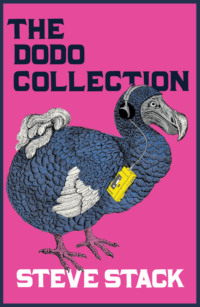Książki nie można pobrać jako pliku, ale można ją czytać w naszej aplikacji lub online na stronie.
Czytaj książkę: «The Dodo Collection»
The Dodo Collection
Steve Stack

Contents
Cover
Title Page
21st Century Dodos
Christmas Dodos
The End?
Further Reading
Dodos Online
About the Author
By the Same Author
Copyright
About the Publisher

STEVE STACK
21st Century Dodos
A Collection of Endangered Objects (and Other Stuff)
Illustrations by Dave Cornmell

Dedication
For Ethan and Martha
who have never heard of most of the things in this book,
the poor, deprived children
Contents
Cover
Title Page
Dedication
Introduction
AT THE CUTTING EDGE OF TECHNOLOGY: Crushed beneath the wheels of progress …
IN THE HOME: Where we all grew up …
IN THE NEIGHBOURHOOD: Where we walked and played, commuted from, and came home to …
ON THE HIGH STREET: Where we shopped, banked, parked, and hung about …
AT SCHOOL: Where we learnt, got into trouble, and grazed our knees …
ON TELEVISION AND RADIO: That we wasted hours in front of …
IN THE CINEMA: Where we sat in the dark, snogged, and ate popcorn …
IN THE NEWSAGENT: Where we bought our sweets and comics …
ALL THE OTHER STUFF: Where I have plonked everything else …
Introduction
With 21st Century Dodos I wanted to commemorate the many inanimate objects, experiences and, well, other things that many of us grew up with but which are either extinct or very much on the way out. Of course, most of these are victims of the eternal march of progress, and that is only to be expected, but it doesn’t mean we shouldn’t mark their passing and bid them a fond farewell.
I was heartened by the reaction to the first edition of the book. I was emailed, tweeted and Facebooked (that’s not a word, is it?) by hundreds of people who wanted to share their thoughts and memories of some of the dodos included. I also received six photographs of white dog poo. Who said a writer’s life wasn’t glamorous?
But most enjoyable of all were the dozens of suggestions for dodos I had missed, and I am delighted to say that I have included as many of these as I could in the new Readers’ Dodos section of this edition. Even more content for less money. I hope you are suitably grateful.
Every entry in this book is given a dodo rating of between one and five dodos. This indicates their rarity, ranging from one dodo (still quite common) to five dodos (completely extinct). No doubt some readers will want to argue with me about the ratings I have allocated each item. Feel free, I love a good scrap. You can email me at 21stcenturydodos@gmail.com.
STEVE STACK
October 2012
AT THE CUTTING EDGE OF TECHNOLOGY Crushed beneath the wheels of progress …

Audio Cassettes
No single entry epitomises the philosophy of this book more than the humble cassette tape. Its fascinating story captures everything that 21st Century Dodos is all about – a new piece of technology rises to become a world leader, installs itself in popular culture, becomes part of everyday life for billions of people …
… but finds itself crushed beneath the wheels of progress, and is now an endangered species.
Despite this, it has left an indelible mark on generations, a legacy that is worth recording (sorry!) here for posterity.
Tape as a recording medium had been around for many years before the compact cassette made its debut in 1962, but it mainly consisted of cumbersome reel-to-reel tapes which were OK for the professionals, but never really took hold in the world of home entertainment.
So, when Dutch company Philips unveiled the compact version, it created a considerable stir. Essentially a reel-to-reel tape shrunk down in size and squeezed into a plastic casing, it was portable, durable, could be played on both sides, and, crucially, was re-recordable. But it wasn’t until Philips agreed to license the format to other manufacturers for no fee that it truly took hold and revolutionised the industry.
In the early days, it was intended purely as a recording device, and cassette players of the era were set up for ease of recording with little emphasis on high-fidelity sound. They were used mainly for dictation, in office and professional work. Sound quality and reproduction were not great, and certainly nowhere near as good as vinyl records, so early attempts to sell pre-recorded music cassettes were not a huge success.
But the companies behind the format kept on tweaking and improving it, and once chromium dioxide tape and Dolby sound reduction were introduced, the music cassette became a viable format to rack alongside LPs and 8-track cartridges in record shops.
Darmowy fragment się skończył.
